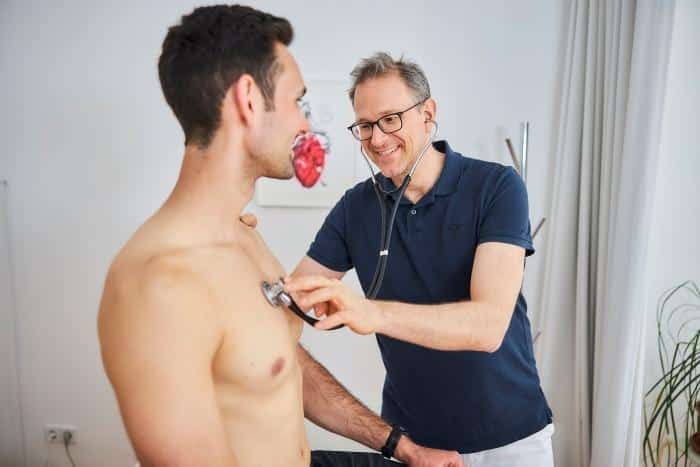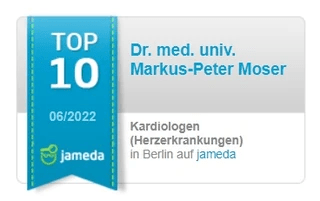Preoperative Diagnostics & Second Opinion

If a cardiac intervention or a cardiac operation should be necessary, the preoperative diagnostics support significantly in order to protect the patient from risks. In the following text we provide information on these individual topics:
Preoperative diagnostics – what does that mean exactly?
What can preoperative diagnostics include?
Possible preoperative examinations
Preparation for preoperative diagnostics
Second opinion in cardiology – why is it important?
Preoperative Diagnostics – What does it mean?
Pre-operative diagnostics are necessary before surgical interventions (depending on the size of the operation and the patient’s previous illnesses) for risk stratification and optimisation. This means that, on the one hand, the risk of the intervention is weighed against the current health situation, and, on the other hand, health-promoting measures are introduced if necessary. The goal is to minimise the overall surgical risk and improve the prognosis.
In addition, the attending physicians (surgeon, anaesthetist, etc.) can optimally prepare for the operation as a team. For this purpose, the cardiologist performs cardiovascular diagnostics to elicit possible health deficits and the preoperative optimisation potential. Anaesthesia has a particularly stressful effect on the cardiovascular system, which is why the cardiologist plays a central role here.
The most important goals of Preoperative Diagnostics are therefore:
- Clarification of the anaesthetic or surgical capability before a planned operation
- Elicitation of the preoperative optimisation potential
What can a Preoperative Diagnosis include?
The diagnostic examinations vary depending on the planned procedure. A detailed conversation gives the cardiologist a first impression of the state of health. State-of-the-art medical equipment is available for more in-depth cardiac diagnostics, if necessary.
Possible Preoperative Examinations include:
DIAGNOSTICS
Electrocardiogram (ECG)
Short Explanation
Simple basic examination for determining the electrical activity of the heart.
Echocardiography (Echo)
This ultrasound examination is used to examine the morphology (shape, form and structure) and function of the heart.
Arteries Doppler
An ultrasound examination of the arteries, especially the carotid or pelvic arteries.
Cardio-CT (computer tomography) of the heart
Cardio-CT (computer tomography) of the heart
The coronary vessels are examined. The modern CTs are not very stressful and provide – non-invasively – information about the blood flow in the heart.
Lung function analysis
The airways are examined for their function.
Laboratory
Examination of the blood.
Cardiac catheter examination
A differentiated, interventional (minimally invasive) medical examination to determine the extent to which the heart, heart valves and coronary vessels are healthy. Here, a stent can be implanted immediately if necessary.
Preparation for Preoperative Diagnostics
In addition to the technical diagnostics, the detailed anamnesis and the personal conversation between the patient and the cardiologist are decisive. The holistic recording of possible backgrounds and accompanying symptoms, the discussion about existing concerns and fears, the clarification of questions that could also be of importance for the patient, must be recorded and analysed.
As the “interface” to the surgeon or anaesthetist, the cardiologist collects all the essential information, if necessary, also in the doctor’s note.
Dr. Markus Moser, MD is a specialist in internal medicine and cardiology, anaesthesiology and emergency medicine, cardiovascular preventive medicine and psychocardiologist. His concern is holistic patient care, which includes the psychocardiological component.
With Dr. Moser, MD you are in very competent and experienced hands. He takes the necessary time for individual treatment, from the first check to surgery preparation and after care as well.
Second Opinion in Cardiology – Why is it important?
New diagnoses often lead to great uncertainty for the patient. Especially when major surgical interventions become necessary or other far-reaching consequences for everyday life arise. Here it can be beneficial to get a second doctor’s opinion before deciding.
A second opinion can support in different situations:
– In the best case, a second opinion can confirm the diagnosis and thus lead to more certainty. However, it can of course also contradict an existing opinion, which should lead to additional examinations and a discussion.
– Each doctor incorporates different specific perspectives, approaches, and treatment options, giving the patient multiple perspectives and additional aspects to their personal issues.
In his private cardiology practice in Berlin Mitte, Dr. Markus Moser, MD is available for a second opinion. It is also possible to get to know him for the first time in a 20-minute video consultation, starting at 4.00 pm. Simply make your appointment online.



